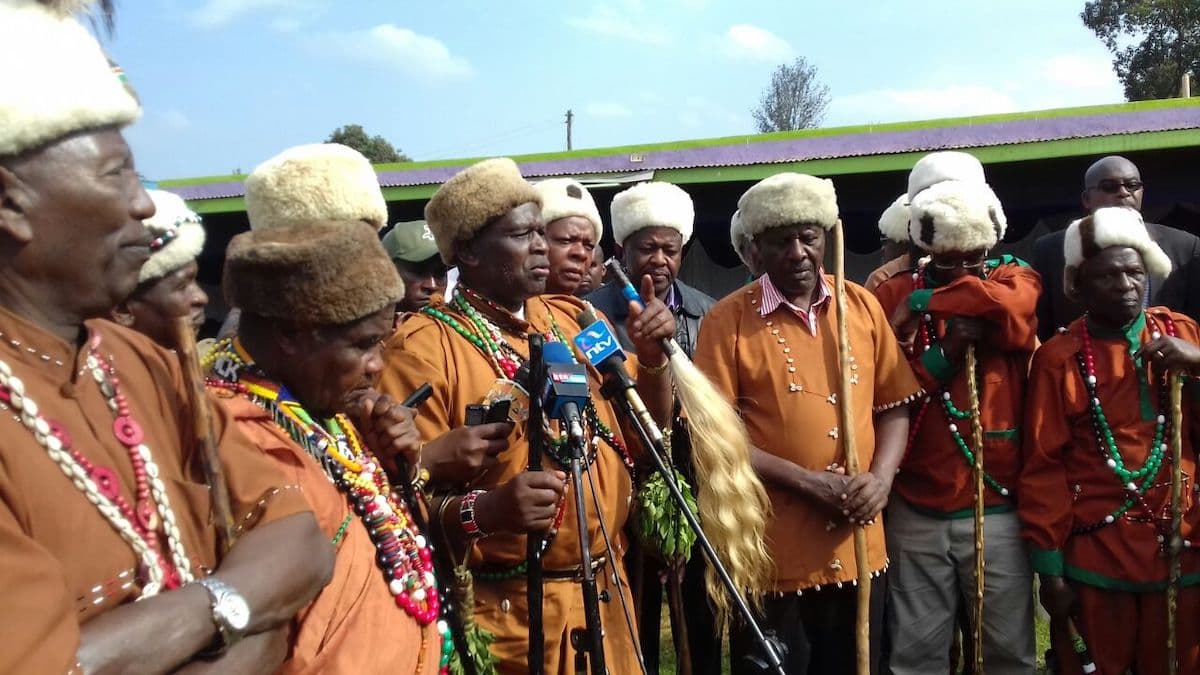We're loading the full news article for you. This includes the article content, images, author information, and related articles.
Often dismissed in the past decade as relics of a bygone era, these cultural custodians are now being called upon—by both the political elite and the grassroots—to mediate tensions, offer counsel, and help steer the region and, perhaps, the nation away from deepening chaos.

Byline: Nyeri, Kenya –
In a political climate roiled by nationwide protests, generational rebellion, and a growing legitimacy crisis at the national level, a quiet but symbolically potent force is re-entering the arena: the traditional Kikuyu elders. Often dismissed in the past decade as relics of a bygone era, these cultural custodians are now being called upon—by both the political elite and the grassroots—to mediate tensions, offer counsel, and help steer the region and, perhaps, the nation away from deepening chaos.
Their resurgence is both striking and complex. It is a reminder of the enduring weight of cultural authority in moments of national fracture—and a signal that many Kenyans, weary of hollow politics, are seeking moral clarity and grounding in tradition.
In recent weeks, senior Kikuyu elders—drawn from respected councils in Murang’a, Nyeri, and Kiambu—have held private consultations with political leaders across divides, including Deputy President Rigathi Gachagua and a group of disillusioned youth representatives. Their message has been consistent: restrain from violence, embrace humility, and return to dialogue.
“We are not here to take power, but to restore sense,” said Mzee Waweru wa Gatonye, a senior elder from the Kiama Kia Ma council, in a rare public statement. “A nation without elders is like a tree without roots—it can stand for a while, but it cannot endure the storm.”
The renewed visibility of the elders comes as cracks deepen in the Mount Kenya political bloc, with growing youth discontent, infighting among elected leaders, and a general perception that traditional power brokers have lost touch with the mwananchi.
At a time when many Kenyans, especially the youth, are rejecting political parties and state institutions as corrupt and unresponsive, the reappearance of elders signals a yearning for alternative sources of authority. Cultural leadership, though informal and symbolic, carries deep legitimacy among communities who feel alienated by elite-driven governance.
“Elders may not hold office, but they hold something more powerful—moral consensus,” says Dr. Lucy Irungu, an anthropologist at the University of Nairobi. “In moments of national confusion, people instinctively turn to what they trust. And trust in modern politics is in freefall.”
There is also an intergenerational dimension. As protests swell under the leadership of digital-native youth with no formal political affiliations, the elders’ intervention is not just about calming tensions—it’s about re-establishing a cultural bridge between age and agency, past and future.
The role of Kikuyu elders in national politics is not new. In the post-independence era, cultural councils like Kiama Kia Ma and the Njuri Ncheke (in the Meru community) played behind-the-scenes roles in arbitrating land disputes, advising leaders, and even shaping electoral choices.
But their credibility suffered in recent years, particularly when sections of the council were seen to endorse specific political candidates—most notably during the Uhuru-Ruto fallout. Critics accused the elders of being co-opted by the political elite and abandoning their traditional neutrality.
Today’s re-emergence appears more cautious and calibrated. Rather than endorsing individuals, the elders are positioning themselves as guardians of unity, warning against violence and calling for inclusive dialogue without partisanship.
In a region wrestling with fragmented leadership and rising generational anger, the return of elders as moral referees is symbolically powerful. It shows that amid institutional failure, communities are looking inward—toward ancestral systems and customary wisdom—for navigation.
Yet symbolism is not enough. Elders, by their very nature, are conservative actors. They are not likely to advocate for structural change, which is what many of the protesting youth are demanding—economic justice, political accountability, and generational transition.
“You can’t solve digital-age problems with iron-age prescriptions,” warns youth leader June Muthoni, one of the organizers of the recent Thika protests. “We respect the elders. But we also want to be heard, not just calmed.”
The re-entry of Kikuyu elders into the political discourse is not merely about mediating unrest—it is about reasserting indigenous frameworks of leadership at a time when formal institutions are struggling to inspire trust. Whether their intervention can lead to tangible de-escalation remains to be seen. But what is clear is that Kenya, once again, is turning to its roots in a bid to steady its future.
As the country stares down the twin threats of authoritarian drift and revolutionary fervor, the elders’ presence reminds all stakeholders—leaders and citizens alike—that wisdom, restraint, and dialogue are not outdated virtues, but urgent necessities.
In this moment of reckoning, the question is not just who leads, but what leads: political force, popular protest—or ancestral conscience.
Keep the conversation in one place—threads here stay linked to the story and in the forums.
Other hot threads
E-sports and Gaming Community in Kenya
Active 8 months ago
The Role of Technology in Modern Agriculture (AgriTech)
Active 8 months ago
Popular Recreational Activities Across Counties
Active 8 months ago
Investing in Youth Sports Development Programs
Active 8 months ago
Key figures and persons of interest featured in this article